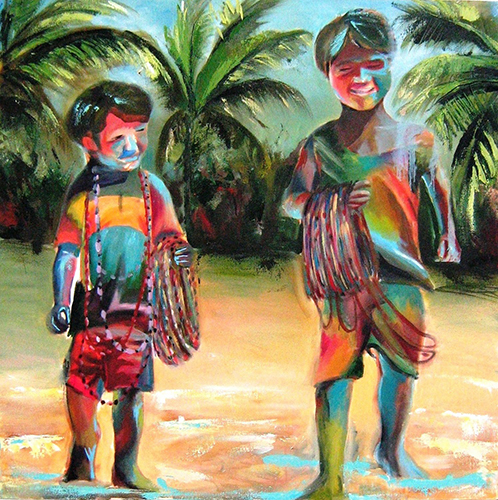Saberes indígenas e mudanças climáticas
A incorporação dos conhecimentos tradicionais como pressuposto para a justiça climática
DOI:
https://doi.org/10.18227/2317-1448ted.v29i02.7879Palabras clave:
Povos Indígenas, Mudanças Climáticas, Conhecimentos IndígenasResumen
As mudanças climáticas afetam os ecossistemas e populações de maneira desigual, com os povos indígenas entre os mais afetados. Partindo da premissa de que os povos indígenas não só enfrentam desproporcionalmente os impactos das mudanças climáticas, mas também possuem um papel crucial na adaptação e mitigação a esse processo, nosso artigo discute a importância de não somente enxergarmos os indígenas como ‘vulneráveis’ ao fenômeno climático, mas também de reconhecer, respeitar e incorporar seus conhecimentos tradicionais como fundamentais para discutirmos as questões ambientais. Argumentamos que, para de fato alcançarmos uma justiça climática, é fundamental incorporar os saberes indígenas no discurso climático, descolonizando as discussões e buscando a redistribuição de ônus e benefícios. Isso requer uma mudança epistemológica, que só é possível de acontecer com a maior participação dos povos indígenas nas negociações em âmbito global.
Citas
BELFER, E. et al. Pursuing an Indigenous Platform: Exploring Opportunities and Constraints for Indigenous Participation in the UNFCCC. Global Environmental Politics, v. 19, n. 1, p. 12–33, fev. 2019.
BORTOLOTTO, F. Participação indígena brasileira na Convenção do Clima: a construção da agenda climática como pauta de luta. Dissertação de Mestrado—Brasília: Universidade de Brasília, 2020.
CUSATO, E. T. Beyond Symbolism. Journal of International Criminal Justice, v. 15, n. 3, p. 491–507, 1 jul. 2017.
DEPLEDGE, J. The organization of global negotiations: constructing the climate change regime. Sterling, VA: Earthscan, 2005.
DOROUGH. The Use of Indigenous Traditional Knowledge in Climate Change Strategies | Wilson Center. Online, 3 nov. 2021. Disponível em: <https://www.wilsoncenter.org/event/use-indigenous-traditional-knowledge-climate-change-strategies>. Acesso em: 30 jul. 2023
FORD, J. D. et al. Including indigenous knowledge and experience in IPCC assessment reports. Nature Climate Change, v. 6, n. 4, p. 349–353, abr. 2016.
HUMAN RIGHTS COUNCIL. Resolution 10/4. Human rights and climate change. Geneva: United Nations, 25 mar. 2009.
IIPFCC. Declaration of the First International Indigenous Peoples’ Forum on Climate Change. The Hague: International Indigenous Peoples’ Forum on Climate Change, 12 nov. 2000.
IPCC. Climate Change 2022 – Impacts, Adaptation and Vulnerability: Working Group II Contribution to the Sixth Assessment Report of the Intergovernmental Panel on Climate Change. Cambridge: Cambridge University Press, 2023.
JUN, J. et al. Indigenous peoples, water, and climate change. Stockholm: Stockholm International Water Institute, 2020.
KRENAK, A. Um Outro Nome para as Mudanças Climáticas: “Tudo o que fere a terra fere aos filhos da terra”. Em: LIMA, A.; FANZERES,
A.; ALCÂNTARA, L. (Eds.). Mudanças Climáticas e a Percepção Indígena. 2. ed. Mato Grosso: Operação Amazônia Nativa (OPAN), 2018. p. 20–23.
KRONIK, J.; VERNER, D. Indigenous Peoples and Climate Change in Latin America and the Caribbean. Washington, DC: The World Bank, 2010.
NAKASHIMA, D. J. Weathering uncertainity: traditional knowledge for climate change assessment and adaptation. Paris, Darwin: UNESCO; UNU-IAS, 2012.
NUSDEO, A. M. DE O.; SILVA, M. G. DE P. E. A proteção dos Direitos Humanos e a agenda climática: convergência e desafios. Diálogos Socioambientais, v. 6, n. 16, p. 9–12, mar. 2023.
OLIVEIRA, A. R. DE; DO VALE, S. B. Amazad Pana’adinhan: percepções das comunidades indígenas sobre as mudanças climáticas, região da Serra da Lua – RR. Boa Vista: Conselho Indígena de Roraima (CIR), 2014.
ORGANIZAÇÃO DAS NAÇÕES UNIDAS. United Nations Declaration on the Rights of Indigenous Peoples. New York: United Nations, 13 set. 2007.
POWLESS, B. An Indigenous Movement to Confront Climate Change. Globalizations, v. 9, n. 3, p. 411–424, jun. 2012.
SULTANA, F. The unbearable heaviness of climate coloniality. Political Geography, v. 99, p. 1–14, 2022.
TÁÍWÒ, O. O. Reconsidering Reparations. Oxford; New York: Oxford University Press, 2022.
UNFCCC. Report of the Conference of the Parties on its twenty-third session, held in Bonn from 6 to 18 November 2017. Addendum. Part two: Action taken by the Conference of the Parties at its twenty-third session. Bonn: United Nations Framework Convention on Climate Change, 8 fev. 2018.
UNITED NATIONS CLIMATE CHANGE SECRETARIAT. Background note: Process to strengthen the observer engagement in the UNFCCC. Bonn: UNFCCC, 2022.
UNITED NATIONS CONFERENCE ON SUSTAINABLE DEVELOPMENT. The future we want. Rio de Janeiro: United Nations, 22 jun. 2012.
VELAND, S. et al. Procedural vulnerability: Understanding environmental change in a remote indigenous community. Global Environmental Change, v. 23, n. 1, p. 314–326, fev. 2013.
YAMIN, F.; DEPLEDGE, J. The international climate change regime: a guide to rules, institutions and procedures. Cambridge; New York: Cambridge University Press, 2004.
Descargas
Publicado
Cómo citar
Número
Sección
Licencia
Derechos de autor 2024 Textos e Debates

Esta obra está bajo una licencia internacional Creative Commons Atribución 4.0.
Los derechos autorales para los artículos publicados son del autor, con derechos del periódico sobre la primera publicación. Los autores sólo podrán utilizar los mismos trabajos en otras publicaciones indicando claramente este periódico como el medio de la publicación original. Se permite el uso gratuito de los artículos en aplicaciones educativas y científicas, desde que citada la fuente.





